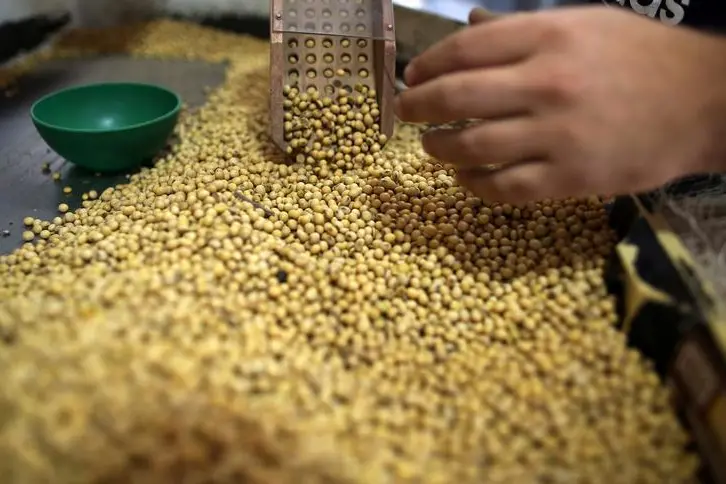PHOTO
Chicago soybeans and wheat eased on Friday as traders decided that a fortnight-long rally which lifted prices from near four-year lows has left the contracts over-valued amid plentiful supply, while corn edged higher after falling the previous day.
All three crops were nevertheless on track for weekly gains.
The most-active wheat contract on the Chicago Board of Trade was down 0.2% at $5.73-1/2 a bushel by 1045 GMT, but up 4% for the week, its second straight weekly increase.
CBOT soybeans fell 0.3% to $10.20-1/2 a bushel but were up 2% over the week for a third consecutive weekly rise, while corn gained 0.2% to $4.11-1/2 a bushel, up 2.6% from last Friday's close, also its second weekly gain in a row.
The rallies were driven by speculators unwinding some of their hefty short positions. Nudging the markets towards higher prices was a weak dollar that stimulated U.S. export demand and poor wheat production in Western Europe.
That tide turned on Thursday however, with commodity funds deciding that the contracts had become over-valued and turning net sellers of CBOT corn, wheat and soybeans, according to traders.
Cheap wheat continues to flow from the Black Sea region, pressuring prices of its main competitors, while the U.S. will shortly begin harvesting what are - despite a dry end to the growing season - predicted to be huge corn and soy crops, creating a flood of new supply.
Many traders are waiting for the U.S. Department of Agriculture to release its September crop estimates next week before making big moves.
Brokers StoneX this week lowered their U.S. corn production estimate to 15.127 billion bushels from 15.207 billion and raised their estimate for U.S. soybean output to 4.575 billion bushels from 4.483 billion.
On wheat, which has risen furthest of the three crops, there has not been enough new information to adjust supply expectations and sustain a rally, said Andrew Whitelaw at agricultural consultants Episode 3 in Canberra.
"We wouldn't be surprised if this move upwards was somewhat of a 'dead cat bounce' and we start to see some slippage in the coming days," he said.
Prices had been supported by reports of poor harvests in Europe, notably in the largest producer France, set to yield the smallest volume in more than 40 years while also producing mixed grain quality after heavy rain and limited sunshine during the growing season.
Updated results on milling quality in this year's wheat crop showed test weights were slightly better than previously estimated but still mostly below common market standards.
(Reporting by Peter Hobson and Sybille de La Hamaide; Editing by Rashmi Aich and Jan Harvey)





















